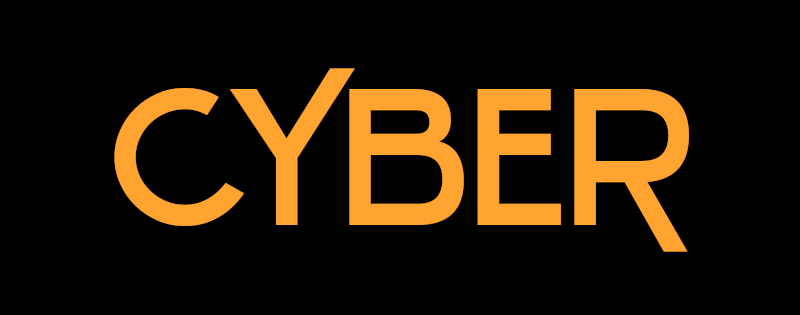One thing that seems to go unappreciated in the comments is the simplicity of this interop proposal: It is essentially about enabling quote-posting of link-aggregator(Groups) posts.
Bluesky + Frontpage will work this way, and I believe it’ll work exceedingly well. If the ap-net corner of the fediverse isn’t interested in this kind of interop, fair enough. To me however the promise of seamless interop between my social apps was what brought me to the fediverse, so that’s the version of the fediverse I will pursue.
> Hey 👋 if you don't know us already, we're building Frontpage; an AT Procol based federated link aggregator. We shipped an initial MVP in closed beta recently and have since been thinking about the road to general availability. > > This post is an RFC (Request for Comments) targeted at technically minded folks who are interested in seeing the progression of atproto for non-Bluesky/microblogging use cases. All that's to say the language that follows assumes some knowledge about how Bluesky and atproto work! I've tried to include links to explain what all of the jargon means though, so hopefully it's not entirely nonsense for folks a little less familiar!
> When you post on Frontpage, we propose that a mirror post will also be created in your Bluesky account. When you comment on Frontpage, we propose that a mirror reply will be created in your Bluesky account. > > Conversely, when you reply to one of these mirrored posts in Bluesky - we will show it as a reply in Frontpage. > > Additionally, Bluesky likes will be translated to Frontpage votes and vice versa.
Let's build another web browser based on Servo!

> As a web engine, Servo primarily handles everything around scripting and layout. For embedding use cases, the Tauri community experimented with adding a new Servo backend, but Servo can also be used to build a browser. > > We have a reference browser in the form of servoshell, which has historically been used as a minimal example and as a test harness for the Web Platform Tests. Nevertheless, the Servo community has steadily worked towards making it a browser in its own right, starting with our new browser UI based on egui last year. > > This year, @wusyong, a member of Servo TSC, created the Verso project as a way to explore the features Servo needs to power a robust web browser. In this post, we’ll explain what we tried to achieve, what we found, and what’s next for building a browser using Servo as a web engine.
Back in June I wrote about an exciting confluence of digital auth tech: ### Social sign-in for indies The focal point of Weird Net...

Back in June I wrote about an exciting confluence of digital auth tech:
(1) The commodification of #OIDC infrastructure, (2) the emergence of #FedCM, (3) and the compatibility of both with #indieauth .
In short, it is now easier than ever to log into web applications using your own website as an identity provider. Or at least, it would be, if your favorite web apps supported these agency-enhancing technologies.
https://blog.erlend.sh/indie-social-sign-in-could-go-mainstream
#opensource #indieweb #identity
https://writing.exchange/@erlend/113091679196090320
> The concept of progress is at the heart of humanity’s story. From the present, it is possible to imagine a future of abundance in which our great challenges have been addressed by the unique human ability to modify the universe toward our own ends. Many believe that we will attain this future through a combination of expanding human knowledge and advanced technologies. > > This article explains how our current idea of progress is immature: it is developmentally incomplete. Progress, as we define it now, ignores or downplays the scale of its side effects. Our typical approach to technological innovation today harms much that is not only beautiful and inspiring, but also fundamentally necessary for the health and well-being of all life on Earth. Developing a more mature approach to our idea of progress holds the key to a viable, long-term future for humanity. > > The way we understand what progress is and how we achieve it has profound implications for our future. Ultimately, it shapes our most significant actions in the world—it affects how we make changes and solve problems, how we think about economics, and how we design technologies. Whatever is not included in our definition and measurement of progress is often harmed in its pursuit. Its side effects (or externalities) occur in a complex cascade, often distributing harms throughout both time and space. The second- and third-order effects of our actions in the world can be difficult to attribute to their original cause, and are frequently more significant than we realize. > > As technology gets more powerful, its effects on reality become increasingly consequential. On our current trajectory, these effects will end civilization’s story long before we merge with machines, or before we have built a self-sustaining colony elsewhere in the solar system. We are not as close to a multi-planetary future as we are to the kind of damage to the biosphere that either destroys or significantly degrades civilization. If we continue to measure and optimize progress against a narrow set of metrics—metrics focused primarily on economic and military growth, which do not account for everything on which our existence depends—our progress will remain immature and humanity will continue its blind push toward a civilizational cliff edge. > > In this article, we use the phrase “the progress narrative” to refer to the way we think and talk about progress in society. The progress narrative is the pervasive idea within our culture that technological innovation, markets, and our institutions of scientific research and education enable and promote a general improvement in human life. This article questions the accuracy, incentives, and risks of this narrative, examining the reasons that the idea has held such a central role in shaping the development of our global civilization. In doing so, it attempts to outline the progress narrative earnestly and clearly, noting that it is often driven by an honest desire to see positive change in the world. The intention is not to point the finger of blame, or to deconstruct for the sake of argument. It is to inform a way forward and outline a path ahead toward potential solutions. > > Drawing on a range of sources, the article takes an interdisciplinary approach to exploring the reality of humanity’s current trajectory. Several prevalent progress myths are reexamined, including apparent improvements in life expectancy, education, poverty, and violence. The roots of these inaccuracies are exposed by widening the aperture of our view. Even if we are living longer, many measures of the quality of life we are living are in decline. Our educational outcomes are in many ways deteriorating, even if access to education is improving. At a global level, despite the common narrative, it is not clear at all that poverty is actually reducing. And the tools of violence have increased vastly in scale of impact since the end of World War II; we now routinely create the kind of weaponry previously reserved for dystopian science fiction. > > To convey a sense of the extent of unintended consequences that can result from a single innovation, the primary case study explores the invention of artificial fertilizers. This development enabled a significant increase in the amount of food (and therefore people) that could be produced. The externalities of this innovation have had far-reaching consequences for human health and the wider biosphere. An assessment of these side effects helps us to open our eyes a little more widely, so that we may glimpse a fraction more of the complex reality that is generally omitted from the simplified narrative of progress. > > Our idea of progress needs to mature. If humanity is to survive and thrive into the distant future, we must transform and elevate the very idea of progress into something truly good and worthy of our shared pursuit and aspiration. As we understand more about the universe and find new ways of changing it with our technologies, we must account for the endless ripple of cause-and-effect beyond our immediate goals. We must factor both the upsides and the downsides that will continue to impact reality long after the technologists of today are gone. > > For our idea of progress to be mature, it must take account of its side effects and plan to resolve them in advance—it must internalize its externalities. In the second part of this article, four specific methods for internalizing externalities are outlined, alongside some clear examples of what such a process might entail. > > The possibility of a mature kind of progress is both grounded and optimistic. It’s a proposal that the human capacity for both wisdom and ingenuity is far greater than we currently imagine. We are capable of holding the unknowable complexity of reality at the very center of how we take action in the world, and mitigating the consequences of the gaps in our knowledge in advance. This enables a *real *kind of progress that reduces suffering, builds a better understanding of the universe and our place within it—and increases our chances of both surviving and thriving into the distant future.
This is an exploratory task to see if there is a better way than a REST API to connect SvelteKit to the Weird core. Right now we have the Weird core library which is implemented in Rust and uses Ir...
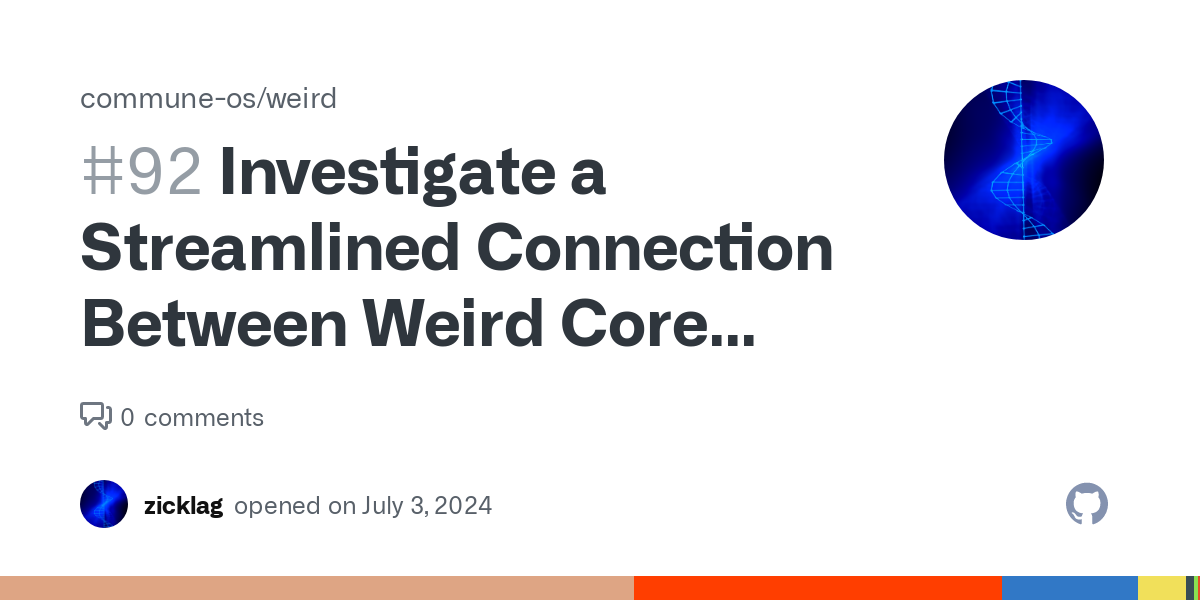
Yeah I get that. What ‘works’ means in the context of local-first is flexible though. This might provide a useful framing: https://blog.jim-nielsen.com/2023/offline-is-online-with-extreme-latency/
In any case, you’re definitely right to focus on your specific use case first without trying to fit it into any specific paradigm. I’m excited to follow Habitat’s progress!
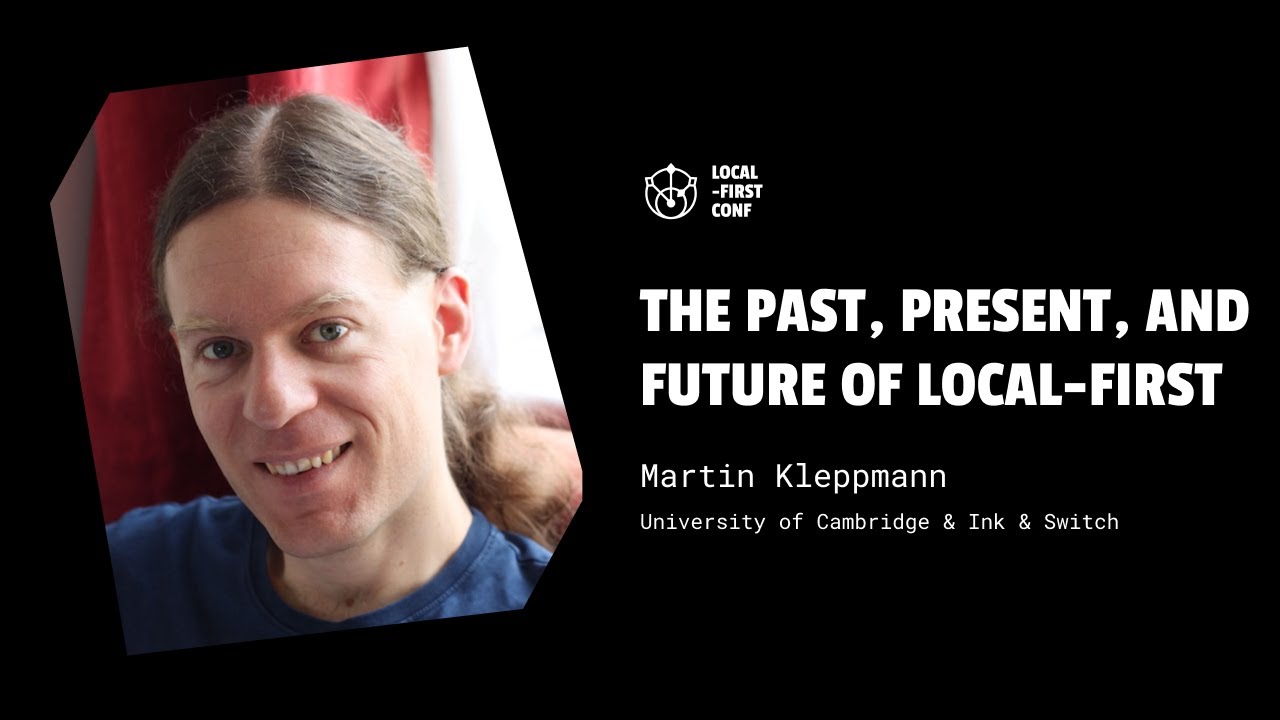
YouTube Video
Click to view this content.
Speaker: Martin Kleppmann, University of Cambridge, Inc & Switch
> We have come a long way since my colleagues and I published the local-first essay five years ago. In this talk I'll review where the local-first idea came from, where we are now, and what I hope the local-first community can work towards in the future.
This sounds great!
Are you familiar with the local-first tenets? Seems like a natural fit for the local nature of your app:
Discussion thread for FEP-7952: Roadmap for Actor and Object Portability, which is a normative FEP about how to create and handle Actor-rooted (as opposed to Server-rooted) ids for objects, based on self-hosted/independently-hosted, and long-lived (migration-aware, migration-suriving) Actor objects....

I think this is the most important (WIP) Fediverse Enhancement Proposal of this year for the #ActivityPub protocol:
FEP-7952: Roadmap for Actor and Object Portability — by @by_caballero@mastodon.social and @dmitri@social.coop
It ties a lot of elementary building blocks for #nomadicidentity neatly together, most succinctly summed up by one particularly magic feature:
Bring-your-own Actor ID! 🪪💫
> Actor profiles can now be hosted separately from the instance (including as a static JSON object on a personal website), which in turn enables service providers to offer their users a “BYO (Bring Your Own) domain name” feature.
That’s really all I ever needed from the notion of a ‘single-user instance’. All I want to manage on my own is my identity; I don’t want to take on the full burden of managing a whole AP server.
In this paradigm, someone’s tiny personal website could also be their Actor-ID Provider, and nothing more. That ID could in turn be used to as a (reasonably nomadic) account on any FEP-7952 compatible instance.
From @by_caballero@mastodon.social:
> the idea is to detach the Actor object (which could be operated by a microserver that consumes almost zero resources, and basically just operates a big redirect table like a link-shortener) from the Service Provider, to be a little more like > email (in the use case where you point a domain that you own and configure at protonmail or mailgun or some other provider) > or SMS service (in that regulation enables you to keep your number when you switch phone co’s). > > We will prototype the micro-Actor in the coming months, but we have no idea how long it would take for implementations like WordPress or forks of Mastodon/Misskey/Pleroma to offer support for this kind of externalized/self-managed Actor. We are hoping existing servers will find it interesting to offer a “service-provider mode” for the nomadic/domain-owning user class, for many reasons. In the meantime, we might also prototype a Fedify-powered server that only allows external Actors to create accounts.
Mastodon: https://writing.exchange/@erlend/112684879834557152
Lua in pure Rust: https://github.com/kyren/piccolo
Maybe it’s doable with the new plug-ins system? I’ve asked in the issue.
This is certainly not spam but rather a blog response, a time honored practice as old as blogging itself.
OP’s article links to the source article (albeit via its fedipost rather than its blog post; maybe best to link both) and contributes to the online discourse with a long form reply, detailing a possible solution.
Mischaracterizing such a clearly well-intentioned contribution as “blog spam” is disingenuous.
edit: thanks for retracting your comment. I hope my retort won’t dissuade you from continuing to engage in this community :)
Absolutely!
Breaking There is one breaking change, which could not have been avoided. Because of a complete rewrite of the logic how custom client logos (uploaded via Admin UI -> Clients -> Client Config -> Br...
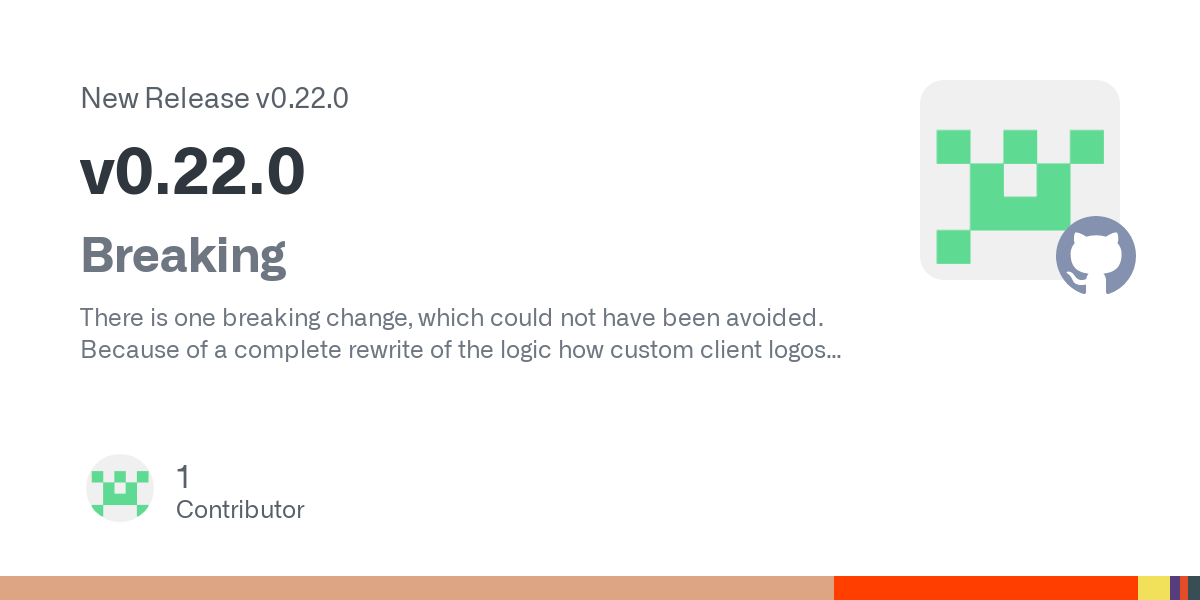
I’m personally very excited about this because Rauthy provides a robust foundation of OIDC-based identity for the fedi-connected platform we’re building with Weird netizens.
The addition of “social logins” such as GitHub means indie platforms like Weird can let people easily sign in with the mainstream identity provider they’ve already got, but once they’ve signed up they’ll have the option of using our open source identity provider for other services going forward, thus reducing their dependency on the Big Corp.
A year ago in Feed Overload I wrote: 99% of all microblog (and chat) content is ephemeral by design, meant for a specific moment in ti...
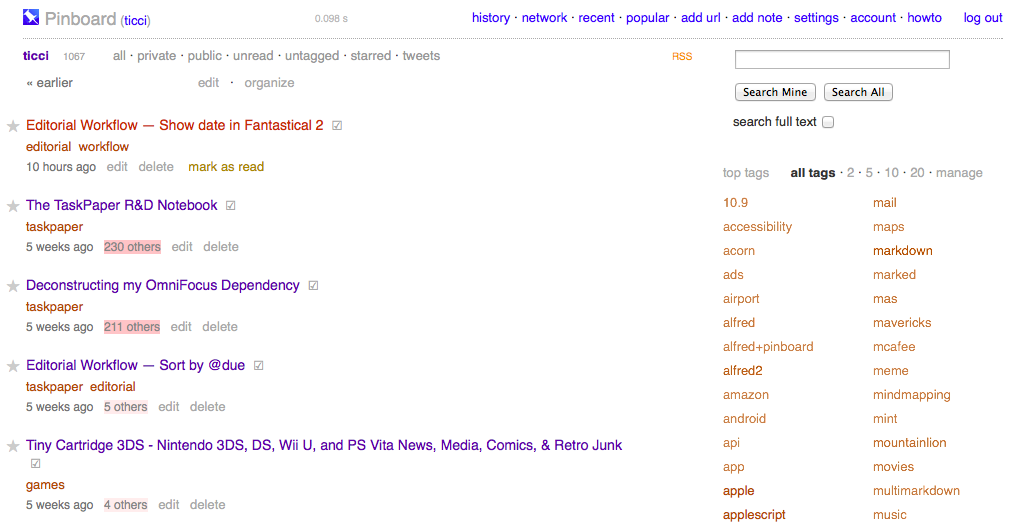
Social bookmarking is a novel use case for ActivityPub and I’m super excited about it. I heckin’ love links and lists! I wanna use them for everything.
Things like Bookwyrm are cool, but it’s not what I want. I just wanna link the thing. Books, films, podcasts, articles, songs.., they’re all just resource recommendations which can be encapsulated by links.
It's been a year since I wrote about Weird web pages as a prospective catalyst for the reclamation of my digital identity. There's been s...
To free ourselves of our current predicament, we must simultaneously de-centralize and re-centralize identity.
- Decentralize ownership.
- Recentralize agency.
By de-centralizing the ownership of identity away from platform monopolies and back to individuals, we can re-centralize the agency of personhood.
The central authority of ones digital identity must first and foremost be the individual themself. That's how we regain our digital sovereignty.
In the glory days of web 1.0, social websites would prominently link out to their digital neighbors via lists known as webrings; magical doorways to an expansive hinterland of digital villages.

In the glory days of web 1.0, social websites would prominently link out to their digital neighbors via lists known as webrings; magical doorways to an expansive hinterland of digital villages.
Let's envision what a truly federated chat like Matrix could do to improve the cross-connectivity of chat channels. Most of these features are already possible, they just haven't been implemented yet in a community-oriented client experience.
I suspect the fedi-collective has more negotiating power in this moment than it realizes. We may as well make some asks, see how Meta responds, and they in turn will see how the public, the media and the regulators respond to them in this bold new era of pervasive Big Tech skepticism.
Money can mitigate the risk of Threads:
'coopting the fediverse': $200k for Test Suite. 'overburdening moderators': $200k for moderation. 'locking in users': $200k for Nomadic Identity
A bit of internet reparations.
https://writing.exchange/@erlend/112163747418805861
Like any other major network incumbent, Discord cannot simply be side-stepped altogether; appropriate off-ramps are required.
#Matrix bridging enables an incremental, non-disruptive transition from the old to the new.
We invite anyone interested in the development of #CommuneApp to join our newly opened space: https://matrix.to/#/#home:commune.sh
The first half of our product rollout starts next month, as we begin publicly testing our uniquely community-oriented Matrix client.
Microblog link: https://writing.exchange/@erlend/112141665369480242
Big Social Media shares many characteristics of a drug, with similar anti-social consequences by overuse. But as with drugs, social media is just a symptom of the underlying problem.
This article gives an overview of the development process of Fish Folly game.

This article shows the overview of the development process of the Fish Folly game using Fyrox Game Engine.
It will still have made the rounds, since it trended on HN: https://news.ycombinator.com/item?id=39667026
Breaking This update is not backwards-compatible with any previous version. It will modify the database under the hood which makes it incompatible with any previous version. If you need to downgrad...
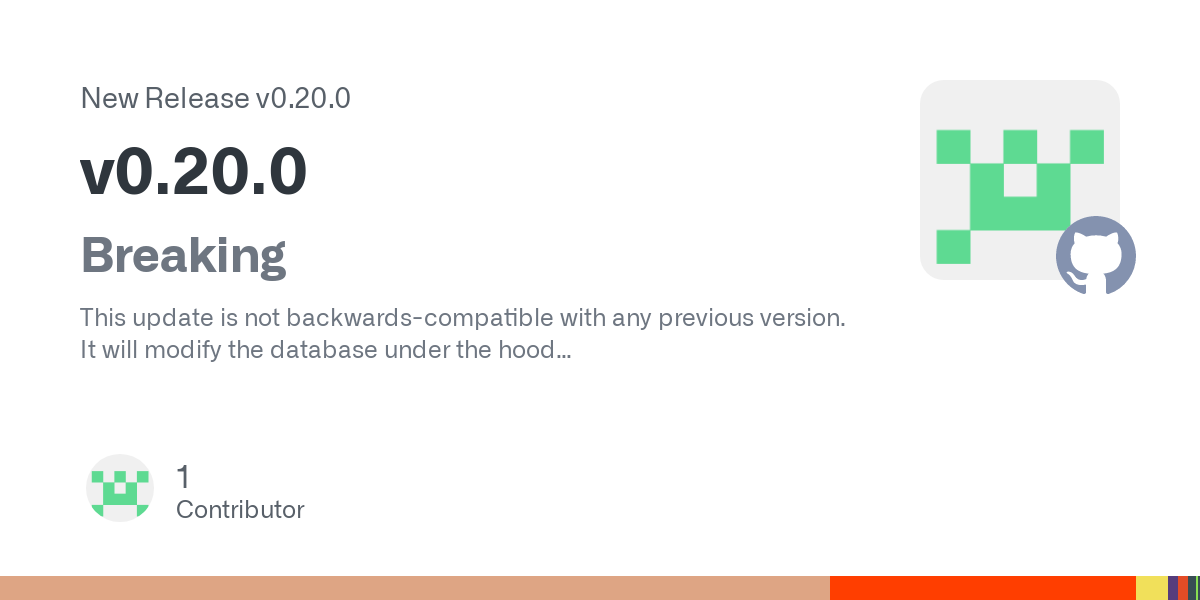
Rauthy is an OpenID Connect (OIDC) Provider and Single Sign-On solution written in Rust.
Cyber is an embeddable language for fast, efficient, and concurrent scripting, ideal for rapid iteration in games and app development. Made with Zig.
At a glance:
- Easy to learn.
- Dynamic and static types.
- Concurrency with fibers.
- Memory safe.
- FFI and Embeddable.
- Fast VM and JIT.
- Cross platform.
First, this: What comes out of Big Corp’s ASS When you hook up your mind to a cloud-controlled Artificial Synthesizer (ASS), you plainl...

Some excerpts:
> ### What comes out of Big Corp’s ASS > > When you hook up your mind to a cloud-controlled Artificial Synthesizer (ASS), you plainly receive their fully digested discharge. > > You don’t get to see what happened further up in the synthetic digestive tract of the ASS, where copious amounts of data grub were initially ingested and processed by a divine black-box entity. > > You don’t have any insight into where and who those morsels of data came from, and you certainly don’t get any say in which of them the entity should or should not consume for processing and output, delivered to you through the ASS-as-a-Service. > > All you’re supposed to do is open your mind’s mouth wide and say “please” and “thank you” for the grossly diluted information bits you’re about to receive.
> They’ve already laid claim to our collective land, labor and attention. With AI, they want to own our thoughts and the last shred of agency that comes with them. If we fail to defend our personal sovereignty at this juncture, a dark age of the corporate singularity awaits us."
> To land a real blow, look for where the machines are at their most materialized. Take aim at their massive bodies of data and strike there with conviction."
Take this🏅
Solid OIDC Support This is the main new feature for this release. With the now accepted RSA signatures for DPoP tokens, the ephemeral, dynamic clients and the basic serving of webid documents for e...
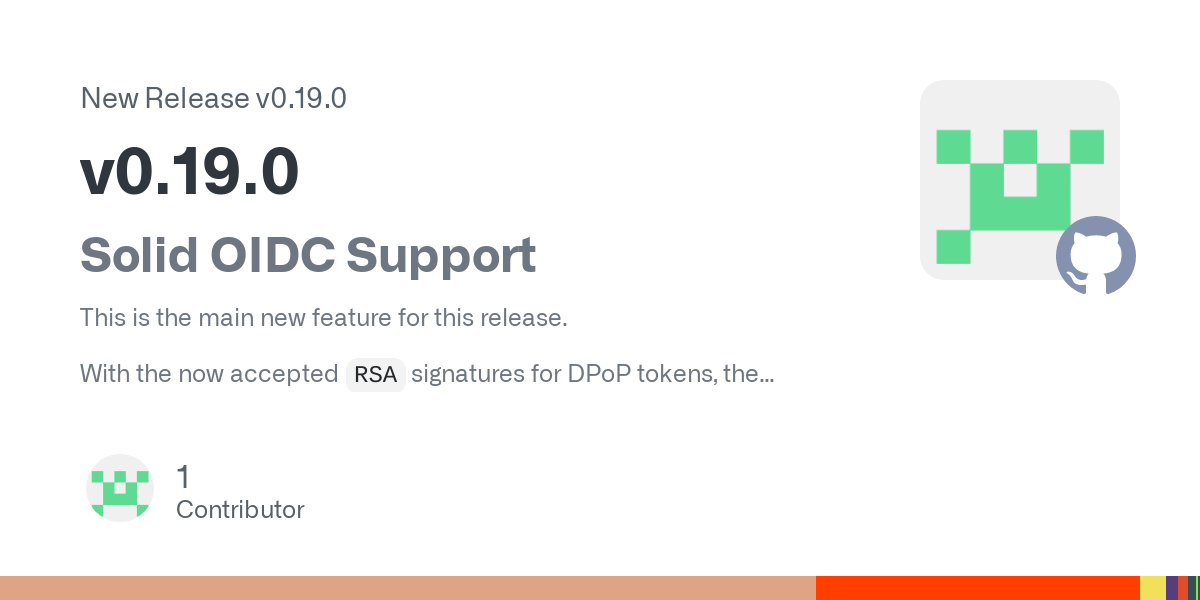
> With the now accepted RSA signatures for DPoP tokens, the ephemeral, dynamic clients and the basic serving of webid documents for each user, Rauthy should now fully support. Solid OIDC. This feature just needs some more real world testing with already existing applications though.
> EVENT_MATRIX_ERROR_NO_PANIC
> This new config variable solves a possible chicken and egg problem, if you use a self-hosted
Matrix server and Rauthy as its OIDC provider at the same time. If both services are offline,
for instance because of a server reboot, you would not be able to start them.
Suddenly every comic post I’ve seen has source links included now!
Maybe it was already a more common practice than I realized, but it sure looks like the fediverse hivemind took my simple bit of feedback to heart and promptly began acting accordingly. I love it here 🥰
One of the best features of Lemmy is that it supports a combination of image and text. I wish including the source link of a comic would be a standard practice on the fediverse, just like alt-text already is.
Source links are great for:
- Properly crediting and driving traffic to artists
- Checking authenticity
- Preventing image degradation for re-shares
p.s. I was thinking of posting this as a meta-post in /c/comicstrips but I only saw guidelines for how to post comics there.
Both the primordial fediverse of ActivityPub as well as the federated Matrix have been mulling over various private-key approaches to the ideal of decentralized or nomadic identity, but I think we’ve been trying to solve too many deep-rooted problems in one go. This has kept us in a holding pattern ...

There’s a major convergence of OAuth/OIDC support across fediverse applications, Matrix is going all-in on it as its root default, and other social web protocols are tagging along as well.
Like the separation of church and state, it seems prudent to keep the management of our digital identities separate from our social network servers.
Domain-based OIDC accounts, especially when self-hosted, serve the function of a minimum-viable ‘nomadic identity’.
With the emergence of Rauthy, being a self-hosted OIDC provider is suddenly viable. All that’s missing is web sign-in (IndieAuth lite) as single sign-on for the masses.
Mastodon post: https://writing.exchange/@erlend/111376285042429865
What you want is Group-to-Group Following, which obviates the need for most cross-posting altogether.
https://blog.erlend.sh/transitioning-r-rust-to-the-threadiverse
https://socialhub.activitypub.rocks/t/fep-d36d-sharing-content-across-federated-forums/3366
I’d strongly prefer this be optional, so I can turn it off. I’ve never been a fan of these ‘half-way’ transitions; it’s one of the main reasons I preferred Photon over Alexandrite.
I also don’t want infinite scrolling, because having to click for more content makes me more aware of my screen time.
Nonetheless, it’s a cool feature that’s probably useful to many people :)
Something a bit similar to what lemmit is already doing, but more powerful with your addition of comments: read-only, best-of archives of really old content from popular subs.
10-5 year old askreddit posts for instance would be interesting blasts from the past to read today. Isn’t there already a ‘best of Reddit’ convention on Reddit itself that resurfaces such content from time to time?
Sounds like the sort of thing Cory Doctorow would write.
Consider relying on contextual advertisements instead: https://kobler.no/en/
Behavioral advertising is rather incompatible with the fediverse and the open movement at large.
Thanks for an awesome app! It covers all the essentials already.
Any plans to onboard more contributors to help with the maintenance burden?
Oh, thanks! I must have followed a gift link via Doctorow’s social because I didn’t encounter the paywall.
Most of the people who organize on SocialHub use this Matrix space to discuss fediverse development:
https://matrix.to/#/%23fediverse-developer-network:matrix.org
Maybe we could get everyone in here instead? They’re eager to decentralize the ownership of the org, so representatives from the Lemmy community would be very welcome to step into leadership roles.

